中国古诗词英文诗歌
中国古诗词英译..
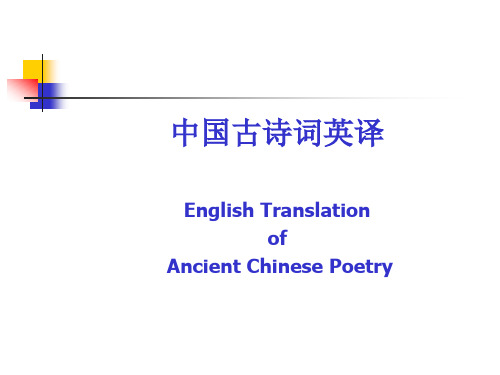
华裔学者叶维廉翻译了Chinese Poetry: Major Modes and Genres(汉诗 英华,1970),被英美许多大学作为教 材多次重印。
J.D.Frodsham等人编译了Anthology of Chinese Verse(中国诗选集,1967), John A. Turner翻译了A Golden Treasury of Chinese Poetry(英译汉诗金 库,1976),包含了自周至清代120多首 古诗译文。
同期,美国翻译家William McNaughton全面翻译了《诗经》(The Classic Anthology Defined by Confucius, 1971),瑞典汉学家B.Karlgren也英译 《诗经》(The Book of Odes, 1950)。 由Robert Kotewall和Norman L. Smith合 译的The Penguin Book of Chinese Verse (企鹅丛书· 中国诗歌卷),在中诗英译 经典化方面开了先河。
1867年,法国贡古尔学院女院士 Judith.Gautier翻译的中国古诗《玉书》 (Le Livre de Jade)被译成多种语言, 在西方世界引起很大反响。 20世纪德国伟大的作曲家Gustav Mahler把《玉书》德文译本的李白、王 维和孟浩然等作为歌词,写成了享誉世 界的合唱交响乐Das Lied von der Eerde (大地之歌)。
诗歌是讲意境的,意境包含两层含义: 一是诗歌的内容是有意蕴的,有着相当的文化内涵,诗歌的 意境和意味便来源于意蕴。艾略特所说的诗歌的可理解性、超民 族性指的就是这个。 诗歌的意蕴决定着诗歌的意义符号系统(sign system),诗歌 的可译性基本取决于此。诗歌的意蕴要素有情感、意象、情景、 人物、事件等是可译的。 当然,在一种语言符号系统中所包含的某些意蕴并不一定能 在别的语言符号系统中找到对等的意蕴,尤其是一个民族所独有 的文化意蕴。比如,中国文化中“君子”好逑、潇湘之“兰”这 两个意象的文化意蕴在西方的任何一个语种中很难找到对应物。 然而,这种意蕴一经阐释,总可以让其他民族的人能了解、理解, 进而达到共鸣。这种诗歌意蕴的可阐释性就是诗歌的可译性。
杜牧《清明》诗英译20种

杜牧《清明》诗英译20种⼜到清明,各⼤英语⽹站纷纷掘出以前的数据,借势再让英语学习者关注。
不过遍览各种帖⼦,发现只有六七种名家英译,且清⼀⾊都是中国⼈翻译的,独独不见外国⼈英译版本,笔者于是探头⼊故纸堆,再借助现代科学技术检索,找出了13种译本及其出处,并对⽹上盛传7种版本的出处做了逐⼀溯源考察以备进⼀步研究,数据⼒求详实准确,欢迎引⽤(需要具体页码可短信联系笔者)。
下⾯作逐⼀罗列:《清明》(唐)杜牧清明时节⾬纷纷,路上⾏⼈欲断魂。
借问酒家何处有?牧童遥指杏花村。
1,托尼·巴恩斯通、周平合译On Purebright Day(Anchor Book of Chinese Poetry,Random House)Purebright Season comes with fine fast drizzleand travelers on the road feel their souls sliced off.Please tell me where I can find a wine shop?A cowherd boy points to distant Apricot Blooming Village.(笔者找到的唯⼀⼀个外国译者译本——确切说是⽬的语译者主动侵⼊、源语译者辅助的⽅式,感觉如何?各种“不美”么,还是我们⽼觉得⾃⼰的才美?中国⽂化⾛出去先⾛⽂化呢还是先⾛美?⽂化⾛出去之后就要⾛美么?这些都是笔者⼀直在⽭盾纠结的问题。
我们的杨宪益许渊冲译本据说——也只是据说——最受外国⼈好评,不过囿于笔者学识浅陋,尚未在⼤⾏于核刊之道的主流论⽂中见到转引转述,是获得了外国汉学家好评呢,还是外国诗歌爱好者的好评呢。
如果有同⾏见到,还请明⽰指教。
)2,丁祖馨、伯顿·拉斐尔合译Qingming Festival(中国诗歌集,辽宁⼤学出版,2003)Qingming Rains never seem to end.The traveller along this road is overcome by dejection."Where can I find a tavern?""Apricot Village, way down the road,"A cow boy replies pointing his finger.(将此译⽂列为第⼆原因在于它是⼀个中英合译本,丁教授在《中国诗歌集》的“致谢”中让美直⾔得到丹佛⼤学伯顿·拉斐尔教授的润⾊,介⼊了英语母语读者——确切说是专家的理解和辅助诠释,使得译本更接近英语读者喜闻乐见的“风格”。
中国古诗英文版
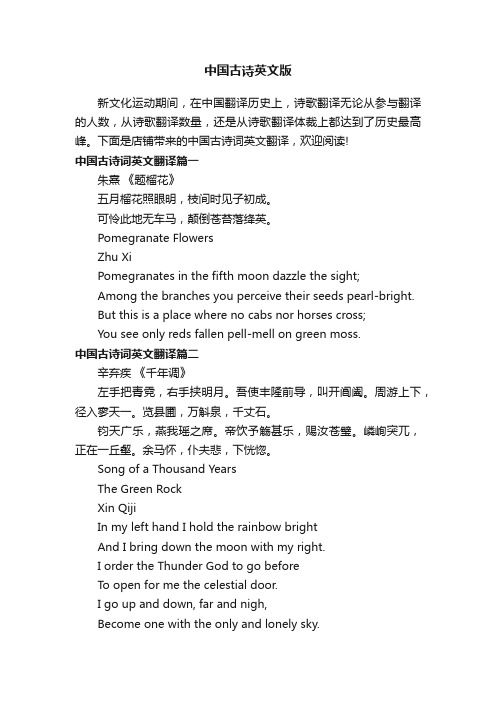
中国古诗英文版新文化运动期间,在中国翻译历史上,诗歌翻译无论从参与翻译的人数,从诗歌翻译数量,还是从诗歌翻译体裁上都达到了历史最高峰。
下面是店铺带来的中国古诗词英文翻译,欢迎阅读!中国古诗词英文翻译篇一朱熹《题榴花》五月榴花照眼明,枝间时见子初成。
可怜此地无车马,颠倒苍苔落绛英。
Pomegranate FlowersZhu XiPomegranates in the fifth moon dazzle the sight;Among the branches you perceive their seeds pearl-bright.But this is a place where no cabs nor horses cross;You see only reds fallen pell-mell on green moss.中国古诗词英文翻译篇二辛弃疾《千年调》左手把青霓,右手挟明月。
吾使丰隆前导,叫开阊阖。
周游上下,径入寥天一。
览县圃,万斛泉,千丈石。
钧天广乐,燕我瑶之席。
帝饮予觞甚乐,赐汝苍璧。
嶙峋突兀,正在一丘壑。
余马怀,仆夫悲,下恍惚。
Song of a Thousand YearsThe Green RockXin QijiIn my left hand I hold the rainbow brightAnd I bring down the moon with my right.I order the Thunder God to go beforeTo open for me the celestial door.I go up and down, far and nigh,Become one with the only and lonely sky.I see the hanging mountainAnd the inexhaustible fountain,And the green rock of a thousand feet high.Hearing heavenly music played,I’m feasted by the Pool of jade.Our Lord invites me to wineAnd gives me a mini-cliff divine.Rugged and steep,It epitomizes mountain high and valley deep.My horse won’t leave,My servant seems to grieve.Awake, I don’t believe.中国古诗词英文翻译篇三陶渊明《归去来兮辞》余家贫,耕植不足以自给。
古诗用英文翻译

To drink together with my neighbor if you wish,
I’ll call him o’er the fence to finish the wine up.
Urchins from southern village know I’m old and weak,
They rob me to my face without a blush on the cheek,
And holding armfuls of straw, into bamboos they sneak.
Golden orioles warble with ease their timely song.
中国诗词的英文翻译篇五
杜甫 《茅屋为秋风所破歌》
八月秋高风怒号,
卷我屋上三重茅。
茅飞渡江洒江郊,
高挂者罥长林梢,
下者飘转沉塘坳。
南村群童欺我老无力,
风雨不动安如山!
鸣呼!何时眼前突兀见此屋,
吾庐独破受冻死亦足!
My Cottage Unroofed By Autumn Gales
In the eighth moon the autumn gales furiously howl;
They roll up three layers of straw from my thatched bower.
The footpath strewn with fallen blooms is not swept clean;
My wicket gate is opened but for you today.
中国古诗名英文翻译对照
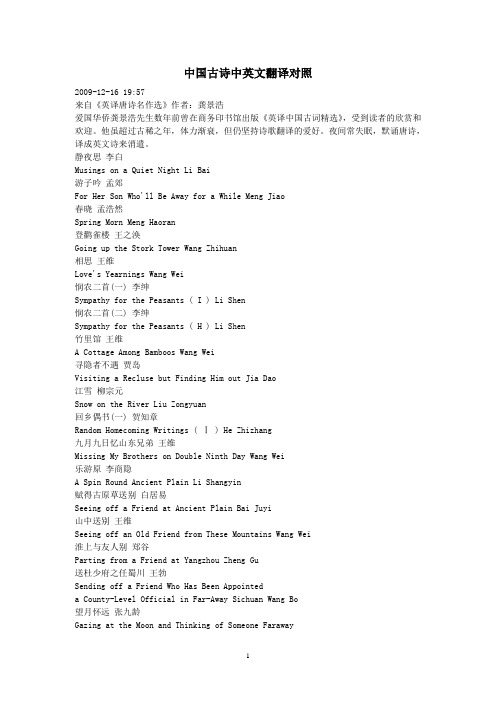
中国古诗中英文翻译对照2009-12-16 19:57来自《英译唐诗名作选》作者:龚景浩爱国华侨龚景浩先生数年前曾在商务印书馆出版《英译中国古词精选》,受到读者的欣赏和欢迎。
他虽超过古稀之年,体力渐衰,但仍坚持诗歌翻译的爱好。
夜间常失眠,默诵唐诗,译成英文诗来消遣。
静夜思李白Musings on a Quiet Night Li Bai游子吟孟郊For Her Son Who'll Be Away for a While Meng Jiao春晓孟浩然Spring Morn Meng Haoran登鹳雀楼王之涣Going up the Stork Tower Wang Zhihuan相思王维Love's Yearnings Wang Wei悯农二首(一) 李绅Sympathy for the Peasants ( I ) Li Shen悯农二首(二) 李绅Sympathy for the Peasants ( H ) Li Shen竹里馆王维A Cottage Among Bamboos Wang Wei寻隐者不遇贾岛Visiting a Recluse but Finding Him out Jia Dao江雪柳宗元Snow on the River Liu Zongyuan回乡偶书(一) 贺知章Random Homecoming Writings ( Ⅰ ) He Zhizhang九月九日忆山东兄弟王维Missing My Brothers on Double Ninth Day Wang Wei乐游原李商隐A Spin Round Ancient Plain Li Shangyin赋得古原草送别白居易Seeing off a Friend at Ancient Plain Bai Juyi山中送别王维Seeing off an Old Friend from These Mountains Wang Wei淮上与友人别郑谷Parting from a Friend at Yangzhou Zheng Gu送杜少府之任蜀川王勃Sending off a Friend Who Has Been Appointeda County-Level Official in Far-Away Sichuan Wang Bo望月怀远张九龄Gazing at the Moon and Thinking of Someone FarawayZhang J iuling白石滩王维White Stone Beach Wang Wei鸟鸣涧王维Birds Chirping over the Hill Creek Wang Wei春夜喜雨杜甫Propitious Rain Falling at Midnight Du Fu宿建德江孟浩然Staying Overnight on Jiande River Meng Haoran滁州西涧韦应物Chuzhou's West Brook Wei Yingwu题破山寺后禅院常建Meditation Rooms at the Back of the Cleft-BoulderHill Temple Chang Jian绝句杜甫A Heptasyllabic Quatrain Du Fu阙题刘脊虚A Poem Lacking a Title Liu Shenxu送元二使安西王维Sending off a Friend, Who Has Been Appointed Envoy to the West Lands Wang Wei凉州词王之涣Liangzhou Song Wang Zhihuan凉州词王翰Liangzhou Song Wang Hah夜宿山寺李白Staying Overnight in a Mountain Temple Li Bai杂诗(其二) 王维Miscellaneous Poems (Second in a Series) Wang Wei问刘十九自居易Asking a Friend Bai Juyi风李峤Wind Li Qiao马诗李贺A Horse Poem Li He秋浦歌李白Autumn Waterside Songs Li Bai剑客贾岛Jianke Jia Dao于易水送人骆宾王Sending off a Warrior By the Yishui River LuG Binwang 春怨金昌绪Complaint Against Spring lin Changxu竹枝词刘禹锡The Bamboo Song Liu Yuxi城东早春杨巨源Early Spring in East City Yang Juyuan晚春韩愈Late Spring Han Yu山亭夏日高骈A Summer's Day in a Hill Garden Gao Pian秋日耿讳An Autumn Day Geng Wei白雪歌送武判官归京岑参Snow (For Chief of Secretarial Staff Wu,Who Was B&ng Called Back to the Capital) Cen Shen过故人庄孟浩然Visiting an Old Friend's Country Place Meng Haoran江村即事司空曙Scene from a Riverside Village Sikong Shu社日王驾Community Day Wang Jia送人游吴杜荀鹤Seeing off a Friend, Who Was Going to Tour Suzhou Du Xunhe 枫桥夜泊张继Night Boat Call at Maple Bridge, Suzhou Zhang Ji早发白帝城李白Sailing Early from Baidi Town Li Bai黄鹤楼送孟浩然之广陵李白Seeing off Fellow Poet Meng Haoran, Who WasLeaving the Yellow Crane Tower for Yangzhou Li Bai黄鹤楼崔颢The Yellow Crane Tower Cui Hao夜雨寄北李商隐A Letter Sent North about These Nightly Rainsin Bashan Mountains Li Shangyin无题李商隐Poem Without a Title Li Shangyin登幽州台歌陈子昂Ascending Youzhou Terrace Chen Zi'ang与诸子登岘首孟浩然Climbing Mount Xianshou with Scholarly Friends Meng Haoran 滕王阁王勃Prince of Teng's Pavilion-House Wang Bo洛阳道储光羲The Luoyang Highway Chu Guangxi遣悲怀元稹Venting My Sorrow Yuan Zhen赠卖松人于武陵To a Tree Vendor Yu Wuling乌衣巷刘禹锡Black Robe Lane Liu Yuxi清明杜牧The Day of Clear and Bright Du Mu江南春杜牧Spring Comes to Jiangnan Du Mu泊秦淮杜牧Overnight Stay on Qinhuai River, Nanjing Du Mu山行杜牧Driving by the Mountain Du Mu金缕衣杜秋娘Garment Stitched with Gold Threads Du Qiuniang自遣罗隐Self Consolation Luo Yin题都城南庄崔护South Side of the Capital City Cui Hu月下独酌李白Drinking Alone Underneath a Moon Li Bai将进酒李白Drink Your Fill! Li Bai春日忆李白杜甫Remembering Li Bai on a Spring Day Du Fu春望杜甫Spring Outlook Du Fu前出塞杜甫Song of the Fortified Town (One from a First Group of"Fortified Town" Poems) Du Fu石壕吏杜甫A Village Official Du Fu陪诸贵公子丈八沟携妓纳凉晚际遇雨杜甫A Cruise on Long-Ditch Creek in the Company of Some Young Gentlemen and Their "Hired" Ladies, and Got Caught in a Shower Along the Twilight Hour Du Fu与朱山人杜甫To Zhu—the Mountain Person Du Fu赠卫八处士杜甫To a Younger Friend, Who Is a Retiring Sort of Person Du Fu李白篇送友人青山横北郭白水绕东城此地一为别孤蓬万里征浮云游子意落日故人情挥手自兹去萧萧班马鸣Farewell To A FriendGreen mountains bar the northern sky;White water girds the eastern town.Here is the place to say good-bye;You'll drift like lonely thisledown.With floating cloud you'll float away;Like parting day I'll part from you.We wave as you start on your way;Our steeds still neigh, "Adieu, adieu!"登金陵凤凰台凤凰台上凤凰游凤去台空江自流吴宫花草埋幽径晋代衣冠成古丘三山半落青天外二水中分白鹭洲总为浮云能蔽日长安不见使人愁On Phoenix Terrace At JinlingOn Phoenix Terrace once phoenixes came to sing;The birds are gone, but still roll on the river's waves. The ruined palace's buried 'neath the weeds in spring; The ancient sages in caps and gowns all lie in graves. The three-peak'd mountain is half lost in azure sky; The two-fork'd stream by Egret Isle is kept apart.As floating clouds can veil the bright sun from the eye, Imperial Court, now out of sight, saddens my heart.宣州谢眺楼饯别校书叔云弃我去者昨日之日不可留乱我心者今日之日多烦忧长风万里送秋雁对此可以酣高楼蓬莱文章建安骨中间小谢又清发俱怀逸兴壮思飞欲上青天览明月抽刀断水水更流举杯销愁愁更愁人生在世不称意明朝散发弄扁舟Farewell To Uncle Yun, The Imperial Librarian, At The Xie Tiao Pavilion In XuanzhouWhat left me yesterdayCan be retained no more;What worries me todayAre the times for which I feel sore.In autumn wind for miles and miles the wild geese fly.Let's follow them with eyes and drink in tower high.Your writing's forcible, like ancient poets, whileMine is in Junior Xie's direct and easy style.Both of us have ambitions high;We'd bring the moon down from the sky.Cut running water with a sword, it will faster flow;Drink wine to drown your sorrow, it will heavier grow.If we despair in our lifetime of all affairs,Tomorrow let us sail away with loosened hairs.赠汪伦李白乘舟将欲行忽闻岸上踏歌声桃花潭水深千尺不及汪伦送我情To Wang LunI, Li Bai, sit aboard a ship about to goWhen suddenly on shore your farewell songs o'erflow. However deep the Lake of Peach Blossom may be,It's not so deep, O Wang Lun! as your love for me.早发白帝城朝辞白帝彩云间千里江陵一日还两岸猿声啼不住轻舟已过万重山Leaving White Emperor Town At DawnLeaving at dawn the White Emperor crowned with cloud, I've sailed a thousand li through canyons in a day. With monkeys' sad adieus the riverbanks are loud;My skiff has left ten thousand mountains far away.月下独酌花间一壶酒独酌无相亲举杯邀明月对影成三人月既不解饮影徒随我身暂伴月将影行乐须及春我歌月徘徊我舞影零乱醒时同交欢醉后各分散永结无情游相期邈云汉Drinking Alone Under The MoonAmong the flowers from a pot of wineI drink alone beneath the bright moonshine.I raise my cup to invite the moon, who blendsHer light with my shadow and we're three friends. The moon does not know how to drink her share;In vain my shadow follows me here and there. Together with them for the time I stayAnd make merry before spring's spend away.I sing the moon to linger with my song;My shadow disperses as I dance along.Sober, we three remain cheerful and gay; Drunken, we part and each goes his way.Our friendship will outshine all earthly love; Next time we'll meet beyond the stars above.杜甫篇望岳岱宗夫如何齐鲁青未了造化钟神秀阴阳割昏晓荡胸生层云决眦入归鸟会当凌绝顶一览众山小Gazing At Mount TaiO, peak of peaks, how high it stands!One boundless green o'erspreads two states.A marvel done by nature's hands,O'er light ang shade it dominates.Clouds rise therefrom and lave my breast;I strain my eyes and see birds fleet.I must ascend the mountain's crest;It dwarfs all peaks under my feet.赠李白秋来相顾尚飘蓬未就丹砂愧葛洪痛饮狂歌空度日飞扬跋扈为谁雄To Li BaiWhen autumn comes, you're drifting still like thistledown. You try to find the way to heaven, but you fail.In singing mad and drinking dead your days you drown.For whom will fly the roc? For whom will leap the whale?兵车行车辚辚马萧萧行人弓箭各在腰耶娘妻子走相送尘埃不见咸阳桥牵衣顿足拦道哭哭声直上干云霄道旁过者问行人行人但云点行频或从十五北防河便至四十西营田去时里正与裹头归来头白还戍边边廷流血成海水武皇开边意未已君不闻汉家山东二百州千村万落生荆杞纵有健妇把锄犁禾生陇亩无东西况复秦兵耐苦战被驱不异犬与鸡长者虽有问役夫敢伸恨且如今年冬未休关西卒县官急索租租税从何出信知生男恶反是生女好生女犹得嫁比邻生男埋没随百草君不见青海头古来白骨无人收新鬼烦冤旧鬼哭天阴雨湿声啾啾Song Of The ConscriptsChariots rumbleand horses grumble.The conscripts march with bow and arrows at the waist.Their fathers, mothers, wives and children come in hasteTo see them off; the bridge is shrouded in dust they've raised.They clutch at the men's coats and stamp and bar the way;Their grief cries loud and strikes the cloud straight, straightaway. Another onlooker by roadside asks an enrollee,"The conscription is frequent," only answers he."Some went north at fifteen to guard the rivershoreAnd were sent west to till the land at forty-four.The elder bound their young heads when they went away;Just home, they're sent to the frontier though their hair's grey. The field on borderland becomes a sea of blood;The emperor's greed for land is still at high blood.Have you not heard two hundred districts east of the Hua Mountain lie Where briers and brambles grow in villages far and night?Although stout women can wield the plough and the hoe,They know not east from west where thorns and weeds o'ergrow.The enemy are used to hard and stubborn fight:Our men are driven just like dogs or fowls in flight.You are kind to ask me.To complain I'm not free.In winter of this yearConscription goes on here.The magistrates for taxes press;How can we pay them in distress!If we had known sons bring no joy,We'd have preferred girl to boy.A daughter can be married to a neighbour, alas!A son can only be buried under the grass!Have you not seenOn borders greenBleached bones since olden days unburied on the plain?The old ghosts weep and cry, while the new ghosts complain;The air is loud with screech and scream in gloomy rain."将进酒 ----李白君不见,黄河之水天上来,奔流到海不复回?君不见,高堂明镜悲白发,朝如青丝暮成雪?人生得意须尽欢,莫使金樽空对月,天生我材必有用,千金散尽还复来。
中国古诗翻译成英文品析

中国古诗翻译成英文品析诗谶是鉴诗者将诗歌作品与诗人或相关人物命运相结合,以求诗歌与史实或本事互相印证的一种诗歌批评形式。
下面小编整理了中国古诗翻译成英文,希望大家喜欢!中国古诗翻译成英文品析《长恨歌》白居易汉皇重色思倾国,御宇多年求不得。
杨家有女初长成,养在深闺人未识。
天生丽质难自弃,一朝选在君王侧。
回眸一笑百媚生,六宫粉黛无颜色。
春寒赐浴华清池,温泉水滑洗凝脂。
侍儿扶起娇无力,始是新承恩泽时。
云鬓花颜金步摇,芙蓉帐暖度春宵。
春宵苦短日高起,从此君王不早朝。
承欢侍宴无闲暇,春从春游夜专夜。
后宫佳丽三千人,三千宠爱在一身。
金星妆成娇侍夜,玉楼宴罢醉和春。
姊妹弟兄皆列士,可怜光彩生门户。
遂令天下父母心,不重生男重生女。
骊宫高处入青云,仙乐风飘处处闻。
缓歌慢舞凝丝竹,尽日君王看不足。
渔阳鼙鼓动地来,惊破霓裳羽衣曲。
九重城阙烟尘生,千乘万骑西南行。
翠华摇摇行复止,西出都门百馀里。
六军不发无奈何,宛转蛾眉马前死。
花钿委地无人收,翠翘金雀玉搔头。
君王掩面救不得,回看血泪相和流。
黄埃散漫风萧索,云栈萦纡登剑阁。
峨嵋山下少人行,旌旗无光日色薄。
蜀江水碧蜀山青,圣主朝朝暮暮情。
行宫见月伤心色,夜雨闻铃肠断声。
天旋地转回龙驭,到此踌躇不能去。
马嵬坡下泥土中,不见玉颜空死处。
君臣相顾尽沾衣,东望都门信马归。
归来池苑皆依旧,太液芙蓉未央柳。
芙蓉如面柳如眉,对此如何不泪垂! 春风桃李花开日,秋雨梧桐叶落时。
西宫南内多秋草,落叶满阶红不扫。
梨园子弟白发新,椒房阿监青娥老。
夕殿萤飞思悄然,孤灯挑尽未成眠。
迟迟钟鼓初长夜,耿耿星河欲曙天。
鸳鸯瓦冷霜华重,翡翠衾寒谁与共? 悠悠生死别经年,魂魄不曾来入梦。
临邛道士鸿都客,能以精诚致魂魄。
为感君王辗转思,遂教方士殷勤觅。
排空驭气奔如电,升天入地求之遍。
上穷碧落下黄泉,两处茫茫皆不见。
忽闻海上有仙山,山在虚无缥缈间。
楼阁玲珑五云起,其中绰约多仙子。
中有一人字太真,雪肤花貌参差是。
金阙西厢叩玉扃,转教小玉报双成。
中国英文版古诗词品析
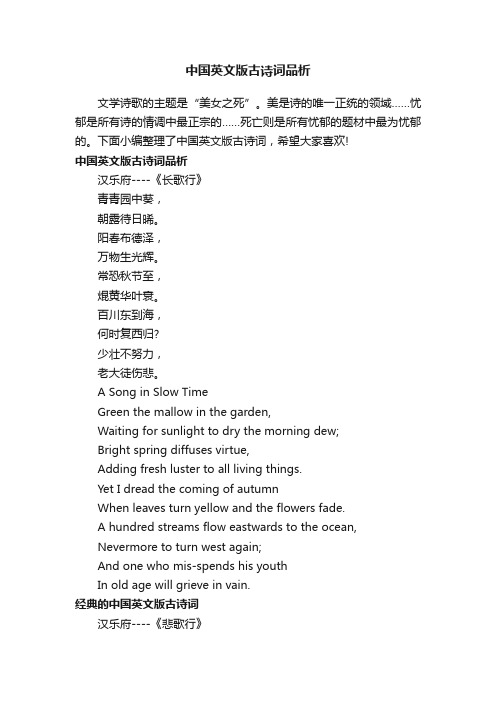
中国英文版古诗词品析文学诗歌的主题是“美女之死”。
美是诗的唯一正统的领域……忧郁是所有诗的情调中最正宗的……死亡则是所有忧郁的题材中最为忧郁的。
下面小编整理了中国英文版古诗词,希望大家喜欢!中国英文版古诗词品析汉乐府----《长歌行》青青园中葵,朝露待日晞。
阳春布德泽,万物生光辉。
常恐秋节至,焜黄华叶衰。
百川东到海,何时复西归?少壮不努力,老大徒伤悲。
A Song in Slow TimeGreen the mallow in the garden,Waiting for sunlight to dry the morning dew;Bright spring diffuses virtue,Adding fresh luster to all living things.Yet I dread the coming of autumnWhen leaves turn yellow and the flowers fade.A hundred streams flow eastwards to the ocean,Nevermore to turn west again;And one who mis-spends his youthIn old age will grieve in vain.经典的中国英文版古诗词汉乐府----《悲歌行》悲歌可以当泣,远望可以当归。
思念故乡,郁郁累累。
欲归家无人,欲渡河无船。
心思不能言,肠中车轮转。
Far from HomeI sing a song of grief instead of weeping,Stare into the distance instead of going home,And dream of my native village,My heart full to bursting.I would go back but have no one to help me,I would cross the river but there is no boat;No words can tell my longing,It seems as if wheels were grinding over my heart! 关于中国英文版古诗词汉乐府----《上邪》上邪!我欲与君相知,长命无绝衰。
咏柳古诗英文版
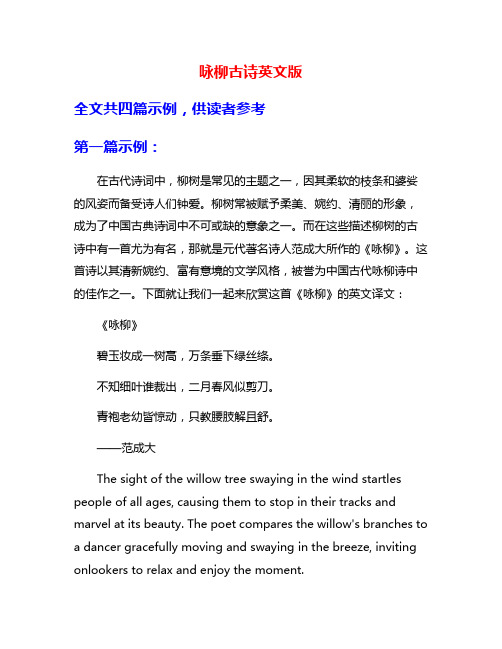
咏柳古诗英文版全文共四篇示例,供读者参考第一篇示例:在古代诗词中,柳树是常见的主题之一,因其柔软的枝条和婆娑的风姿而备受诗人们钟爱。
柳树常被赋予柔美、婉约、清丽的形象,成为了中国古典诗词中不可或缺的意象之一。
而在这些描述柳树的古诗中有一首尤为有名,那就是元代著名诗人范成大所作的《咏柳》。
这首诗以其清新婉约、富有意境的文学风格,被誉为中国古代咏柳诗中的佳作之一。
下面就让我们一起来欣赏这首《咏柳》的英文译文:《咏柳》碧玉妆成一树高,万条垂下绿丝绦。
不知细叶谁裁出,二月春风似剪刀。
青袍老幼皆惊动,只教腰肢解且舒。
——范成大The sight of the willow tree swaying in the wind startles people of all ages, causing them to stop in their tracks and marvel at its beauty. The poet compares the willow's branches to a dancer gracefully moving and swaying in the breeze, inviting onlookers to relax and enjoy the moment.第二篇示例:《咏柳》是古代诗人写给柳树的赞美诗篇,对柳树的形象进行描绘和赞美。
柳树在中国文化中有着深厚的意义,被视为一种柔顺、顽强和生命力顽强的象征。
柳树的形象不仅在古诗中被赞美,也在许多文学作品和艺术作品中出现。
咏柳古诗英文版不仅展现出了柳树的魅力,也展现了古代诗人对自然的热爱和对生命力的追求。
1. Poem by Du Fu:The willow leaves are green in the eastern wind,Their shadows play on the courtyard wall.The spring river's waters shine like jade,And swallows dart through the sky.第三篇示例:The willow tree has long been a beloved subject in Chinese literature and poetry. Its graceful and gently swaying branches have inspired countless poets throughout history to write verses that capture the beauty and symbolism of this iconic tree. One of the most famous poems about the willow tree is “A Lam ent for Yingzhou” by Du Fu, a prominent poet in the Tang Dynasty. In this poem, Du Fu expresses his sorrow over the devastationcaused by war and reflects on the fleeting nature of life, using the willow tree as a metaphor for resilience and endurance.第四篇示例:柳是我国传统文学中常见的题材之一,唐代诗人对柳树的描写更是达到了巅峰。
- 1、下载文档前请自行甄别文档内容的完整性,平台不提供额外的编辑、内容补充、找答案等附加服务。
- 2、"仅部分预览"的文档,不可在线预览部分如存在完整性等问题,可反馈申请退款(可完整预览的文档不适用该条件!)。
- 3、如文档侵犯您的权益,请联系客服反馈,我们会尽快为您处理(人工客服工作时间:9:00-18:30)。
I wander'd lonely as a cloud
I WANDER'D lonely as a cloud
By William Wordsworth
I wandered lonely as a cloud
That floats on high o'er vales and hills, When all at once I saw a crowd,
A host, of golden daffodils;
Beside the lake, beneath the trees, Fluttering and dancing in the breeze.
Continuous as the stars that shine
And twinkle on the Milky Way,
They stretch'd in never-ending line
Along the margin of a bay:
Ten thousand saw I at a glance,
Tossing their heads in sprightly dance.
The waves beside them danced; but they
Out-did the sparkling waves in glee:
A poet could not but be gay,
In such a jocund company:
I gazed -- and gazed -- but little thought What wealth the show to me had brought:
For oft, when on my couch I lie
In vacant or in pensive mood,
They flash upon that inward eye
Which is the bliss of solitude;
And then my heart with pleasure fills, And dances with the daffodils.
To the cuckoo
*O blithe new-comer! I have heard,?
I hear thee and rejoice.?
O Cuckoo! shall I call thee Bird,
Or? but a wandering V oice?
While I am lying on the grass
Thy twofold shout I hear;
From hill to hill it seems to pass
At once far off, and near.
*Though babbling only to the Vale,
Of sunshine and of flowers,
Thou bringest unto me a tale
Of visionary hours.
*Thrice welcome, darling of the Spring! Even ye thou art to me
No bird, but an invisible thing,
A voice a mystery;
The same whom in my schoolboy days I listened to; that Cry
Which made me look a thousand ways In bush, and tree, and sky.
*To seek thee did I often rove Through woods and on the green;
And thou wert still a hope, a love;
Still longed for, never seen.
*And I can listen to thee yet;
Can lie upon the plain
And listen, till I do beget
That golden time again。
O blessed Bird! the earth we pace Again appears to be
An unsubstantial, faery place;
That is fit home for thee!
致杜鵑
歡樂的新客啊!我已聽到了
你的叫聲和歡喜。
杜鵑啊!該稱你為鳥兒,
或只是飄揚的音波呢?
此刻我正躺臥綠野上,
靜聽你呼喚的聲音
這聲響從山崗越過山崗,
忽遠忽近。
你只向山谷咕咕傾訴,
詠嘆陽光和花兒,
這歌聲卻彷彿在向我述說
如夢年華的故事。
春天的驕子!歡迎你歡迎
至今,我仍覺得你
不是鳥兒,而是無形的精靈
是音波,是一團神秘。
與童年時期聽見的一模一樣:
那時,你的啼叫聲
總使我向樹叢、林木、天空
百遍千遍探看不已。
為了尋覓你我多次遊蕩,
越過林間和草地。
你是希望,你是愛
被渴求,卻看不見。
今天,我仰臥在草原上,
靜聽妳的樂音,
直到我心底悠悠再現
往昔的黃金歲月。
吉祥的鳥兒啊!
這在我們腳下的沃野大地,
如今彷彿又成了夢幻仙境,
正適合給你居住。
Sonnet 18
William Shakespeare
Shall I compare thee to a summer’s day?
Thou art more lovely and more
temperate:
Rough winds do shake the darling buds of May, And summer’s lease hath all too short a date: Sometime too hot the eye of the heaven shines And often is his gold complexion dimmed;
And every fair from fair sometime declines,
By chance or nature’s changing course untrimmed; But thy eternal summer shall not fade,
Nor lose possession of that fair thou ow’st;
Nor shall death brag thou wander’st in his shade, When in eternal lines to time thou grow’st:
So long as a man can breathe, or eyes can see,
So long lives this, and this gives live to thee.
我該把你比擬做夏天嗎?
你比夏天更可愛,更溫婉:
狂風會把五月的嬌蕊吹落,
夏天出租的期限又太短暫:
有時天上的眼睛照得太熱,
他金色的面容常常變陰暗;
一切美的事物總不免凋敗,
被機緣或自然的代謝摧殘:
但你永恆的夏天不會褪色,
不會失去你所擁有的美善,
死神也不能誇說你在他陰影裡徘徊,
當你在永恆的詩行裡與時間同久長:
只要人們能呼吸或眼睛看得清,
此詩將永存,並且賜給你生命。
